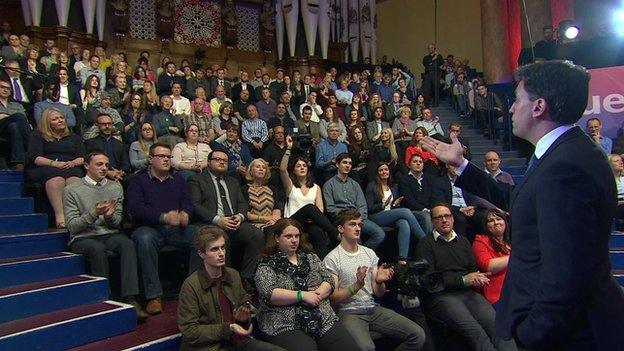Nicola Sturgeon tells debate SNP would have 'big clout' at Westminster
- Published
Nicola Sturgeon talks about her offer to Ed Miliband to "keep David Cameron out of Downing Street"
Nicola Sturgeon has told a live TV audience in Glasgow that the SNP would have "big influence and big clout" at Westminster.
The SNP leader said that David Cameron and Ed Miliband were "clinging to the pretence that one or other of them is going to get a majority".
A quarter of the audience in the BBC Scotland debate, hosted by Glenn Campbell, were SNP supporters.
The rest were supporters of other parties and undecided voters.
Earlier in the evening, party leaders David Cameron, Ed Miliband and Nick Clegg took part in a 90-minute Question Time programme hosted by David Dimbleby from Leeds Town Hall.
UKIP's Nigel Farage and Plaid Cymru's Leanne Wood appeared in separate programmes.
The Question Time show is the final programme of four that were agreed after drawn-out negotiations between parties and broadcasters over the timing and line-up of this year's election TV debates.
All the debates are being shown, with reaction, on the BBC's Election Live page.
'Not about independence'
Ms Sturgeon, the Scottish First Minister, told the audience at BBC Scotland's Pacific Quay HQ: "What I know from experience is that if there is a minority government, opposition parties have big influence and big clout."
Referring to Ed Miliband's debate, she said: "He sounded as if he was saying that he would rather see David Cameron and the Conservatives back in government than actually working with the SNP.
"If he means that, then I don't think people in Scotland will ever forgive Labour for allowing the Conservatives to get back into office."
She added: "If he's in a minority government he will not be able to get policies through without working with other parties.
"I have never ruled anything out. But I have also said, and before Ed Miliband by the way, the most likely outcome is where we are supporting a Labour minority government on an issue-by-issue basis."
Ms Sturgeon, who is not standing in the general election, would not commit to who would be the party leader at Westminster. SNP MPs are currently led by Angus Robertson, but Alex Salmond could potentially take on that role if he is elected.
She was challenged on the SNP's previous line that last year's Scottish independence referendum was a once-in-a-generation vote.
"This election is not about independence. Even if the SNP won every single seat in Scotland next week that won't result in a referendum. This is about making our voice heard.
"If you (the people of Scotland) want it to be once in 20 lifetimes, that's what will happen. I can't impose a referendum on Scotland against its will."
Ms Sturgeon said delaying the elimination of the deficit by three years was a "price worth paying".
She said the SNP had a "fiscally responsible, modest alternative to austerity". Their plan would take "two, possibly three years longer to completely eliminate the deficit".
The SNP leader was also questioned on poverty, the NHS and support for people facing mental health problems.
She said health spending in Scotland and NHS staff numbers had reached record levels since the SNP came to power in Scotland.
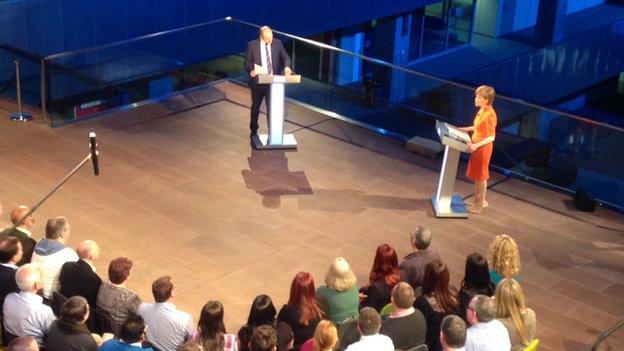
Nicola Sturgeon was questioned by the audience in Glasgow
"But I am not the kind of politician to stand here and say 'job done'," she added. "We always need to work to improve our health service."
After facing audience comments on their experiences of mental health services and the NHS, she said: "It's not good enough. I'm not the politician who will defend the indefensible."
She said child poverty was falling until 2012 when Conservative welfare reforms were introduced.
"These things are shameful," she said.
"We spend £100m mitigating Tory welfare cuts. If we can get SNP MPs to the House of Commons, maybe we can end the bedroom tax."
'Plucky and brave'
In the Question Time programme, Conservative leader Mr Cameron insisted there would be no cuts to child benefit or child tax credits but it was possible to save more from the welfare budget.
Labour leader Mr Miliband was earlier grilled on a post-election deal with the SNP.
"If the price of having a Labour government was a deal or a coalition with the Scottish National Party, then it is not going to happen," he told the audience.
He also ruled out a "confidence and supply" arrangement with the SNP.
Nick Clegg, leader of the Liberal Democrats, defended his decision to go into coalition with the Conservatives. He said: "I will never apologise...for having stepped up to the plate in a plucky and brave way."
In a separate broadcast from Cardiff, Plaid Cymru leader Leanne Wood declined to rule out striking a deal to put Labour in power after the election even if the SNP was not involved.
She said it was highly irresponsible of the Labour leader to rule out a deal with the SNP and claimed it could open the door for a Conservative government.

Analysis by James Cook, Scotland Correspondent BBC News
What Ed Miliband said on Question Time about the Scottish National Party may have sounded similar to his previous statements but in one crucial respect it was not.
For some time the Labour leader has been insisting that he isn't just ruling out a formal coalition with the SNP but that he is "not going to have a deal" at all.
What does that mean?
Pressed by David Dimbleby, Mr Miliband said he was ruling out both a coalition and "confidence and supply" - a looser arrangement where one party agrees to support another in votes of confidence and on the budget (supply) in return for some guaranteed policy concessions.
The SNP have made it clear that their price for such a deal would be a commitment not to renew the Trident nuclear weapons system, based on the Clyde in the west of Scotland, and an "end to austerity" in favour of "modest" increases in public spending.
"Confidence and supply, they've said, which is where you sort of have an arrangement, I'm not doing that. I'm not doing that," said Mr Miliband.
"I'm not going to sacrifice the future of our country, the unity of our country, I'm not going to give in to SNP demands around Trident, around the deficit or anything like that," he told the Question Time audience.
But in Scotland that anti-austerity, anti-Trident message is proving quite popular according to the polls which are suggesting the SNP could take 50 or more of the country's 59 seats on Thursday. In 2010 Labour won 41 seats, the SNP just six.
Less popular
The idea of a Tory government remains rather less popular north of the border. They won just one seat in 2010. The Liberal Democrats have 11.
Mr Miliband said something similar at the weekend when Andrew Marr asked him "no support and supply deal of any kind?"
"I'm not interested in any deals, no," he replied.
So why were tonight's comments different? Because this time the Labour leader effectively admitted that he would actually prefer a Conservative government to an anti-austerity, anti-Trident agreement with the SNP.
"If it meant we weren't going to be in government, not doing a coalition, not having a deal, then so be it."
Asked specifically if he would rather lose office than have any kind of deal, Mr Miliband appeared pretty clear.
"If the price of having a Labour government was a coalition or a deal with the Scottish National Party, it's not going to happen," he said.
It is one thing to argue that the voting SNP could deprive Labour of a majority and allow a Conservative government in by the back door.
Minority government
It is quite another to indicate that you would actually prefer a Tory government to any kind of deal, even if the combined numbers of Labour and SNP MPs could, in Nicola Sturgeon's phrase, "lock David Cameron out of Downing Street".
"Let me be plain. We're not going to do a deal with the Scottish National Party. We're not going to have a coalition. We're not going to have a deal," said Mr Miliband.
The SNP leader's response as she faced an audience on BBC1 Scotland will be repeated by her supporters all week.
"He sounded as if he was saying that he would rather see David Cameron and the Conservatives back in government than actually work with the SNP," said Ms Sturgeon.
"If he means that then I don't think people in Scotland will ever forgive Labour for allowing the Conservatives to get back into office," she added.
Ms Sturgeon argues that the parliamentary arithmetic in a hung parliament could mean that the Tories simply wouldn't have enough MPs to pass any legislation and that Labour might end up as a minority government with SNP support, whether it wanted it or not.
Labour in turn is sticking to its line that every seat the SNP wins from Labour is good news for Mr Cameron.
In less than a week, in the privacy and solemnity of the polling booth, the people of Scotland will make a decision which could have a profound effect on the entire United Kingdom.
- Published1 May 2015
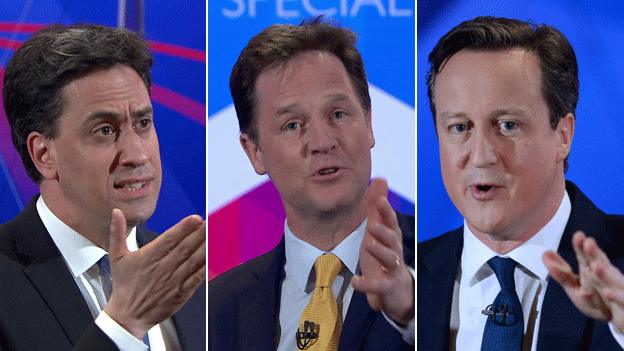
- Published30 April 2015
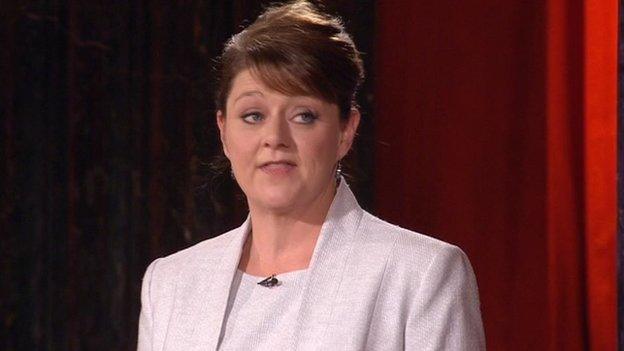
- Published30 April 2015
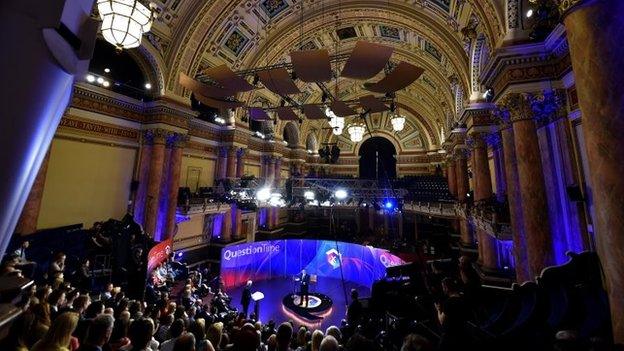
- Published1 May 2015
